militia, with fever, influenza and desertion. On receiving intelligence of the failure of Indian negotiations, he broke camp at Cincinnati, and, marching to Greenville, proceeded to fortify a position there for the winter. Knowing the Indians to be bold, dexterous and vigilant, Wayne judiciously guarded his camp from surprise by employing several scouts under the command of Captain Wells, to range the forest in various directions and keep up a keen scrutiny upon the movements of the enemy. On the 30th of June, 1794, the Indians attempted to regain the ground of St. Clair's defeat, and on the same day Fort Recovery was attacked by Little Turtle at the head of an army cf from one thousand to fifteen hundred warriors. The Indians made the attack with determination to carry the fort or die in the attempt. They were repulsed, but they renewed the contest the next day, and it was not until a great number of their bravest chiefs and warriors were killed that they reluctantly abandoned the daring enterprise. On the 28th of the following month, Wayne, having been joined by General Scott with 1,600 Kentuckians, moved to the confluence of the Auglaize and the Maumee. Here Fort Defiance was erected. A deserter, having informed the Indians of the approach of the army, Wayne was prevented from taking them by surprise as he had anticipated. He therefore found on his arrival that the main body of the savages
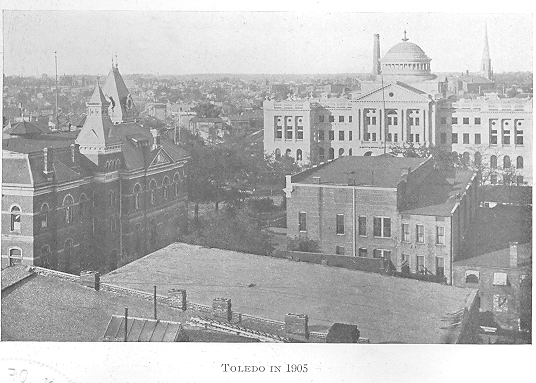
TOLEDO IN 1905
had retired down the Maumee about thirty miles to the foot of the rapids, where the British had recently erected a fortification. The General fully informed himself of the strength of the enemy, and that his own regulars were about as numerous as the enemy, besides having eleven hundred mounted men from Kentucky, under the command of General Scott. This gave General Wayne a decided advantage, but notwithstanding his superiority in numbers, notwithstanding the high discipline of his troops and their patriotic ardor for a battle, he still offered terms of peace to the enemy and awaited the answer.
- 50 -
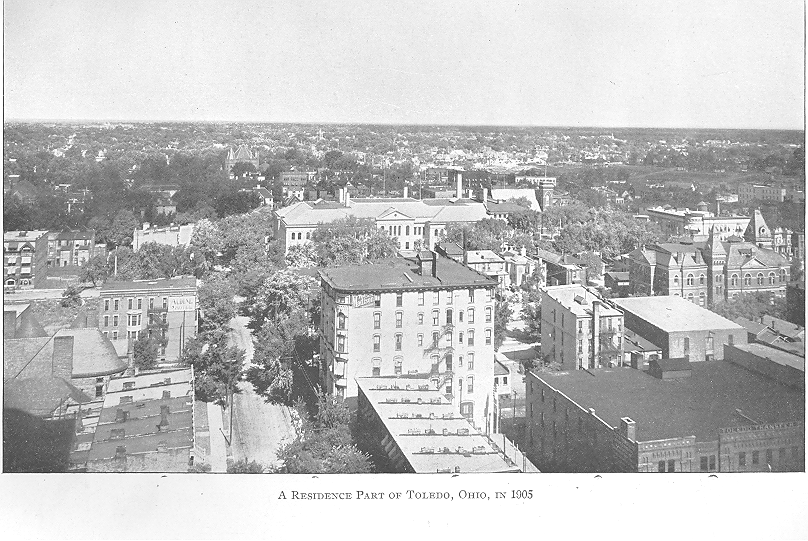
The answer was war. So on the 15th day of August, 1794, General Wayne left Fort Defiance and marched down the Maumee, his right being covered by the river. Three days tiger he arrived at the head of the rapids, where he erected some temporary works to protect his baggage. He found the Indians advantageously posted in front of an English fort. On the evening before the battle, an Indian council was held, composed of chiefs from the Miamis, Shawanese, Pottowatomies, Delawares. Ottawas, Chippewas and Senecas, the seven Indian nations engaged in the action. Little Turtle, the most celebrated warrior and statesman of his time, was present and addressed the council, strongly urging the necessity of accepting the proposals of General Wayne. "We have beaten the enemies," said he, "twice under separate commanders. We can not expect the same good fortune always to attend us. The Americans are now led by a chief who never sleeps. The night and the day are alike to him; and during all the time that he has been marching upon our villages, notwithstanding the watchfulness of our young men, we have never been able to surprise him. Think well of it. There is something whispers me it would be prudent to listen to his offers of peace." Blue Jacket was, however, at that time commander-in-chief. He opposed Little Turtle, the better judgment of that intelligent warrior was rejected, and war resolved upon. About 8 o'clock in the morning of the 20th day of August, the army advanced to the attack. The

ON THE BATTLEFIELD OF FALLEN TIMBERS
NEAR TOLEDO, O.
See Explanatory Notes
enemy had joined in three lines within supporting distance from each other in a windfall extending from the west bank cf the Maumee and protected by the British garrison. They could not have secured a better position from such a mounted force as Wayne's, and their position extended among the Fallen Timbers. The first effort of the enemy was to turn the left flank of Wayne's army. At the very first discharge of a rifle the legions were formed into two lines and commanded to drive the enemy into the thicket at the point of the bayonet ; then, but not till then, to deliver the first fire and press the enemy so closely as not to give them time to reload their guns. Seeing the strength of the enemy, and that they were endangering the left flank of the Americans, General Wayne ordered the second line to support the first already engaged. The legionary cavalry was ordered to
- 53 -
press forward upon the enemy, who occupied the river's bank, and where there was no timber. General Scott was ordered to make a circuit, so far as to outflank and turn their right flank. All these orders were promptly obeyed, but such was the fury of the first line that the second line could scarcely find occupation. The enemy was broken, routed and slain, or driven two miles in one hour through this windfall and thicket until they were within pistol shot of the British garrison, which was presently surrounded by their blazing cornfields and cabins. The near approach of the troops to the British works drew forth a letter of remonstrance from Major Campbell, its commandant. A sharp correspondence ensued, in which General Wayne denied the right of the British to build a fort there and requested the Major to retire within the limits prescribed to the British by their treaty with the United States. This Campbell refused to do until commanded to retire by his superior officer ; at the same time he warned Wayne not to approach within the reach of his cannon.
The erection of this fort within the acknowledged territory of the United States had received the attention of the Government, and General Wayne had private orders to drive out the intruders, if, in his opinion, such a step was necessary to the success of his operations against the Indians. On the morning before the army retired he carefully inspected the defenses of the fort, and soon saw that his artillery was not sufficiently heavy to make any impression on its massive walls, and that the other fortifications were of such an order to make an escalade only possible at the expense of many human lives, which the occasion would not justify. He therefore abandoned all thoughts of effecting its reduction ; and having driven the Indians from their principal settlements, destroyed their winter's provisions, and erected forts in the country to prevent their return, he fell back on Fort Defiance, the defenses f which he completed, and finally retired with his army into winter quarters at Greenville. This campaign tranquilized the whole Indian frontier. Next summer Wayne held a council with all the Indians living in this territory, and on the 3d day of August, 1795, at Greenville, he purchased all the territory, not before ceded, within certain limits, comprising in all about four-fifths of the present State of Ohio. The Indians were left in possession of the Northwestern part of the territory.
This treaty was the foundation of a permanent peace. It was the act of all the tribes who had then a claim to the territory east of the Wabash, and the observance of its conditions was secured by the expectation of solid benefits, as the rewards of good faith, and by the dread of severe retributions as the consequence of infractions. Its effect on the prosperity and improvement of the West was immense. Confidence in the disposition and ability of the Government to protect the Western settlers was universally restored, and the emigrant no longer had the fear of the tomahawk and the scalping knife, of the midnight conflagration and the noonday ambush, before his eyes when he undertook the conquest of the wilderness. Occasional aggressions, by whites as well as by Indians, still continued to occur, but no combination of tribes, nor any single tribe, again lifted the tomahawk against the United States until just before the outbreak of the War of 1812 with England.
As has been said, the States who gave over for the country at large their claims in the territory had fixed conditions for their surrender. What has long been known as the Western Reserve was detained by Connecticut, which sold small claims rapidly. A permanent settlement was effected on the site of Cleveland, in 1796, and by 1800, the Reserve had over one thousand inhabitants. In that year, having reaped all the income she could hope to get immediately, Connecticut surrendered jurisdiction to the Reserve, and it became a part of the Northwestern Territory. Another settlement owes its existence to causes quite as distinct as those of Gallipolis, and played a much more important part in the early history of the State. An earnest band of Presbyterians, under the leadership of Reverend Hubbard W. Finley, had
- 54 -
settled in Kentucky, in 1792, but soon became animated by the abolition principles, and considered removing into "free" territory. With this in view, their pastor wrote to Colonel Nathaniel Massey, who some years before had bought valuable land in the Scioto Valley, but had been unable to found a colony on it. The lands were splendidly adapted for settlement, being rich, fertile and picturesque, but attractive, especially because, removed a little way up the Scioto, it was less liable to attacks by the Indians than were the towns on the Ohio. When the treaties that followed Wayne's victory of Fallen Timbers removed the great red danger, Massey and the Presbyterians soon came to terms that were liberal in the extreme. He laid out a town in July, 1796, and gave a lot free to each of the first settlers. Before th end of this year twenty cabins had been erected, and Chillicothe had begun its existence. It was given the name of the principal tribe of the Shawanese, who had formerly occupied that part of the State. This settlement soon became one of the most prosperous and important in the territory. The first government of Ohio was a very flexible affair. There was no Legislature, or rather none in which the people had a voice, for at the formation of the territory.there were no people to assert self-government, except the Indians, who preferred the tomahawk and the flint locks they had received for their participation in the earlier wars. The Governor, the Secretary, who was also Lieutenant Governor, and the Judges were the supreme law-making council, except, of course, they could not overstep the provisions of the ordinance under which they were appointed. In the absence of his advisors the Governor could act alone in a very wide classification of cases. The Judges also had extensive power besides that of hearing cases and deciding disputes. The minor judiciary established in each of the little settlements exercised civil and criminal jurisdiction and were administrators and executors as well as judges. There was no fixed seat of government, nor could there well be in so widely distributed, thinly settled an area embracing all that is now, Ohio, Illinois, Michigan, Wisconsin and a little strip of Minnesota, including the site of St. Paul. Besides the wide scope of country over which they had jurisdiction and the difficulty of attempting to maintain anything like a general supervision of the whole territory, it must also be recorded that there is no evidence to show that any of the law-makers and enforcers possessed unusual talent for statecraft. General St. Clair was an officer of the Revolution who had gained the confidence of Washington. He had abandoned Fort Ticonderoga upon the approach of Burgoyne's army, in 1777, and for this was severely censured, but an investigation proved this to be a prudent, if not a heroic course. As previously stated, his own campaign against the Indians had ended in disaster, which certainly did not establish for him a record as an able commander. In civil affairs he was, generally speaking, no greater success. Not possessing a judicial mind, and certainly no great or firm grasp of affairs, his enactments were promoted by little foresight and soon became confused. In view of this inefficiency of the early Government, Governor and Cabinet went into session in Cincinnati and formed the first "code." They repealed contradictory laws and worked out something of a system, establishing local governments and a general court at Cincinnati and Marietta.
A better order of things was soon to come. In the years following Wayne's campaign emigration increased rapidly. It is said that at least one thousand boat loads of settlers passed Marietta on their way to the lower river towns in 1796. The first towns grew and others were settled. A clause of the original ordinance provided that whenever the population of the territory would reach or exceed five thousand it should be entitled to a more popular and stable government, resembling that granted to the territories still existing. This limit was reached in 1798, and Congress sanctioned the change. In February, of the following year, arrangements were made for the election of a Territorial Legislature that was to
- 55 -
serve two years. According to the Ordinance of 1787, the Legislature was to nominate ten freeholders of five hundred acres or more and submit the list to Congress, which would select five to act as a Legislative Council, serving five years. This Legislature was duly elected on the third Monday in November, convened in Cincinnati, and proceeded to enact much-needed legislation. Some of the ablest men of the country were members of this first Legislature, among them being Jacob Burnet, Edward Tiffin and Thomas Worthington. This Legislature passed an act making valid without question many of the St. Clair laws that had been disputed, and not the least important step was the election of General William Henry Harrison as delegate to Congress. With this Legislature Ohio began to take form. A decided reform in the land laws stimulated settlement, and something like stable government took the place of the general chaos. In 1800, the census accredited the Eastern portion of the territory, what is now Ohio and Michigan, with a population of 42,000, and in the same year the territory was divided, the Eastern part retained the name and officers ; the Western part became Indian Territory, under the Governorship of William Henry Harrison. This, however, did not entirely end all troubles. General St. Clair evidently felt that the Territorial Legislature was encroaching upon his rights, and he obstructed much which was afterwards proved to be good legislation. Stubborn quarrels soon began between him and the prominent men of the territcry. There is no doubt that he was inclined to be dictatorial beyond the limits justified 'by his ability as a statesman, and though it is unlikely that blame was entirely on his side, he was soon the most unpopular man in the whole territory. At the beginning of the nineteenth century an aggressive agitation fcr the admission of Ohio into the Union as a State was commenced. A second census was taken by order of the Territorial Government early in 1802, and in April of the same year Congress authorized the call of a convention to frame a State Constitution. This move, however, was opposed by many, and in June of that year, a convention was 'held at Marietta, to protest against the granting of statehood to Ohio. A resolution was passed, asking Congress to change the western boundary to the Scioto River and leave that section in possession of its territorial government, but Congress could not see any wisdom in such a step. The Constitutional Convention met at Chillicothe in November, 1802, in which city the seat of government of the Northwestern Territory had been established in 1800, and adopted a Constitution for a State that was destined to become one of the most important factors in the great American Federation. The convention, besides adopting a constitution and deciding upon the advisability of Statehood, called the first election of State officers to be held on the 11th of January, 1803. It also made the express provision, that until the n ew offrcers should take charge of their offices, on the 1st of March, 1803, Ohio should continue under the Territorial Government, submissive, as heretofore, to Congress. The Constitution was submitted to Congress, approved, and on the 19th of February, 1803, Ohio was admitted into the Union as a State.
Governor St. Clair, who had been removed from his office 'by President Jefferson, in November, 1802, was a candidate for election to the position which he had held by appointment, but he was overwhelmingly defeated by Edward Tiffin, the first Governor of the State of Ohio.
- 56 -
CHAPTER IV
The Infancy of a Great State
The First Constitution of Ohio.—Executive, Legislative and Judicial Departments.—Their Duties Defined. Conspiracy of Aaron Burr. Impeachment of the Courts. - Harrison Defeats the Indians at the Tippecanoe River. - The War of 1812 against England.—Ohio the Battleground of Fierce Fights.—Siege of Fort Meigs.— Massacre of Dudley's Kentuckians.—Defense of Fort Stephenson.—Perry's Glorious Victory on Lake Erie.
- 57 -
OHIO was now a State and a member of the Federal Union. The Constitution of the State, adopted by the convention in November, 1802, in uniformity with the Constitution of the United States, conferred the elective franchise on every white male resident of the State, twenty-one years old. It otherwise made the usual distribution of State power in three departments, legislative, judicial and executive. The executive power was vested in a Governor. The Governor, elected for two years, could be re-elected for three consecutive terms, and, after being out of office for the period of one term, could again be eligible. This privilege, however, has never been used to the full extent of its limits. The arbitrary conduct of Governor St. Clair was so generally recognized 'by the delegates that in the preparation of a Constitution they resolved to divest the office of Governor of all privileges which by their exercise might to the slightest extent prove unsatisfactory to the people. The veto power, that anomaly in republican governments, was not recognized in the first Constitution of Ohio. It was the duty of the Governor to communicate such information and recommend such measures to the Legislature, as he might think expedient ; on extraordinary occasions it was in his power to convene the General Assembly ; and in case of disagreement between the two houses of the Legislature, as to the time of adjournment, he could adjourn them; but with the business of legislation he had nothing to do. He was made Commander-in-chief of the army and navy of the State; except in cases of impeachment he might grant reprieves and pardons ; all commissions were to be made out by him under the great seal, and he had the power to fill vacancies which might occur during the recess of the General Assembly in offices of legislative appointment, by granting commissions which should expire at the end of the next session, but beyond the exercise of these privileges, he was rendered powerless.
The legislative power was committed to a General Assembly, consisting of a Senate and House of Representatives. The Senate was to have not less than one-third nor more than one-half of the members allowed to the House. While the members of the latter were to be not less than seventy-two nor more than seventy-six in number, and be chosen annually, apportioned to the different counties according to the number of legal voters in the same, the members of the Senate were to be elected biennially. No Judge or Clerk of any court, or member of Congress, or a person holding office under the United States, or any lucrative office except in the militia, or as Justice of the Peace under the State, could be a member of the Legislature. Bribery rendered the person elected by its aid ineligible for that office for two years. The qualifications of members were, that they should be citizens of the United States, free from the disqualifications mentioned, inhabitants of .the State of Ohio, residents within the district from which they might be elected, and taxpayers ; Representatives to be at least twenty-five years of age, and Senators at least thirty years old. No property qualifications were necessary. Property, as such, the Legislature did not represent, nor regard in the distribution of political power. By joint ballot the Legislature appointed Judges and State officers, civil and military, and fixed their salary and compensation. Each House might choose its own officers, establish rules for its proceedings, punish
- 59 -
its members for misbehavior, expel the same if a two-third vote concurred, and punish con-tempts committed against its dignity by persons not members. Bills could originate in either House, subject to alteration, amendments or rejection by the other. The power to impose taxes to raise a revenue, though not expressly recognized by the constitution, could be exercised as a power necessarily implied. Each House was to sit with open doors, unless secret session was necessary, such necessity to be decided by a two-thirds vote. _The Governor and all other civil officers were, for misdemeanors in office, liable to impeach- ment by the House of Representatives and triable by the Senate. sitting as a high court for that purpose, but no conviction could ensue unless by la two-thirds vote of the Senators sitting in such court. No punishment beyond removal from or disqualification for office could

MAP OF OHIO IN 1802
follow conviction, but, whether acquitted or convicted, the person was subsequently liable to indictment and triable, with judgment and punishment according to law. No money could be drawn from the treasury except by legislative appropriation, and an accurate account of receipts and expenditures should be annually published with the laws.
The judicial power was vested in a Supreme Court, Courts of Common Pleas, in Justices of the Peace, and any other manner of courts the Legislature might establish and prescribe. The Supreme Court consisted of four Judges and by all, or by any two of them, a court should be held once a year in each county. Each Common Pleas Court should consist of a President and Associate Judge. The State was divided into circuits, the number of Which might be increased with the increase of the population. For each circuit one presiding Judge and for each county not less than two and not more than three Associate Judges should be appointed. Each of these Circuit Courts had original and appellate jurisdiction
- 60 -
"in common law, chancery and criminal cases." The Court of Common Pleas had "juris- diction of all probate and testamentary matters, granting administration and the appoint- ment of guardians." All the Judges should be appointed for a term of seven years, and, except the associates, were compensated with salaries. They were forbidden to hold any other office for profit or trust, or receive fee or perquisite for their duties. Each court .could appoint its own clerk. The Justices of the Peace were elected 'by the townships, one to each, to serve for three years. Sheriffs and Coroners to be elected biennially, but no
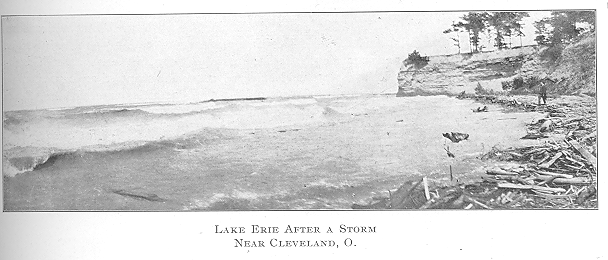
LAKE ERIE AFTER A STORM
NEAR CLEVELAND, O.
election of the same person to the former office for a third term was permitted. Officers of
towns, and other township officers to be elected annually, and the Legislature was authoriced to designate the manner of filling all public offrces, not specially mentioned in the con-
stitution. In addition to these matters of power, the great doctrines established by the ordinance of 1787, were, in a more solemn manner, stated and confirmed. The people were recognized as the original source of power, with the right of the citizen under the requirement of law, to speak, write or print as he might think proper and making himself liable for the abuse of that right. All prisoners should be humanely treated, granted a speedy and impartial trial, and punished proportionately to the nature of the offense committed. Imprisonment should be restricted to certain conditions, involving fraudulent intent, poll taxes should be prohibited, and the Legislature was denied the liberty of granting any hereditary privileges. Finally, the constitution provided for the incorporation of associations to be regularly formed within the State, on application to the Legislature for that purpose by private bill; and that amendment and revision of the State Constitution should only be made by a convention to be elected whenever a majority of the people, on the recommendation of two-thirds of the Legislature, might vote for the same. To the constitution was fixed a schedule, providing that the Territorial laws
should remain in force until repealed
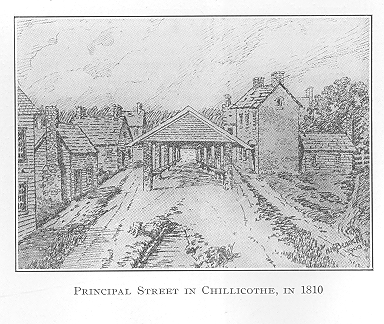
PRINCIPAL STREET IN CHILLICOTHE, IN 1810
- 61 -
by the Legislature of the State; the first election was to be held in January, and the first General Assembly required to convene at Chillicothe on the first Tuesday of March, 1803.
The first General Assembly under the constitution met at the appointed day. Michael Baldwin was elected Speaker of the House of Representatives and Nathaniel Massie Speaker of the Senate. The General Assembly proceeded to appoint all the officers necessary to carry on the business of governing the State. The' offices were filled as follows: Secretary of State, William Creighton, Jr.; Auditor of State, Colonel Thomas Gibson; Treasurer, William McFarland; Judges of the Supreme Court, Samuel Huntington, Return J. Meigs, Jr., and William Sprigg; President Judges of the First, Second and Third, Districts, Francis Dunlevy, Wyllis Silliman and Calvin Pease ; United States Senators, Thomas Worthington and John Smith. The Legislature passed such laws as seemed to be needed, and organized seven new counties : Gallia, Scioto, Geauga, Butler, Warren, Greene and Montgomery. Those parts of the State had suffered much for want of an organization into counties. St. Clair had continuously refused to have these counties erected. The State courts were organized, their jurisdiction defined, and their practice, in some degree, regulated. Judges of the courts were, as above stated, in conformity with the constitution, and the courts of the territory—the General Court, the Circuit Courts, the Orphans' Courts, the Courts of Common Pleas, and the courts of general quarter sessions—were all abolished. Most of the powers, formerly exercised by the courts of quarter sessions, in establishing highways, erecting public buildings, granting licenses, etc.. were transferred to the Associate Judges of the Courts of Common Pleas. The tax laws of the territory were slightly modified and continued in force. The Associate Judges, in each county, were authorized to appoint County Treasurers, to whom the Territorial County Treasurers were required to deliver their books, papers and accounts, and the Treasurer of the State was instructed to receive from the United States Treasury three per cent of the proceeds of the public lands within the State (all of such lands remaining the possession of the United States Government) as agreed upon. The manner of electing the one member of Congress, to which the State 'by population was entitled, was also determined. In the following election, Jeremiah Morrow became the first member of Congress from the State of Ohio.
On the 5th day of December, 1803, the second General Assembly convened at Chillicothe, with Nathaniel Massie Speaker of the Senate, and Elias Langham Speak-
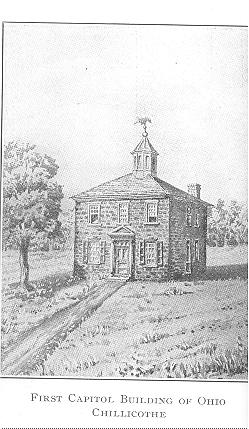
FIRST CAPITOL BUILDING OF OHIO
CHILLICOTHE
er of the House. During this session twenty-nine laws were enacted. All the territorial laws governing the militia were repealed and replaced by State laws. Legislation was enacted for the incorporation of townships and the election of County Commissioners; to divide the State into counties, stipulating that no new county should have less area than four hundred square miles. To enable aliens to hold lands within the State and enjoy the same property rights as citizens of the United States ; to appropriate the three per cent funds receivable from the
- 62-
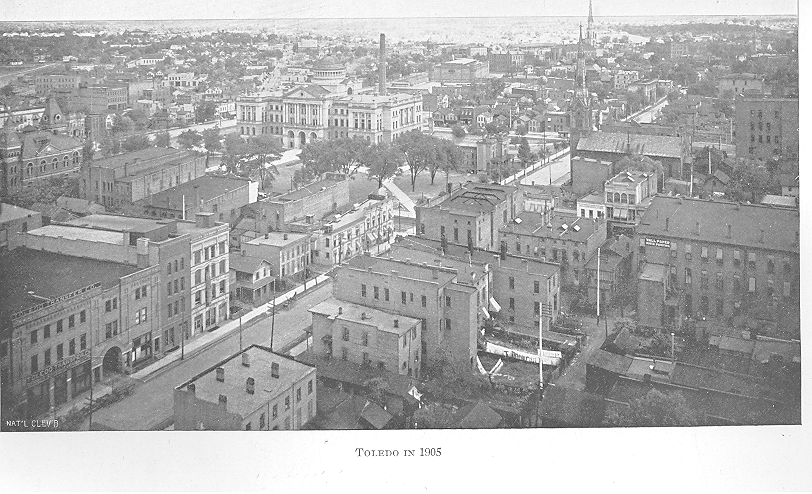
United States Treasury to the construction of roads, the same to be divided into small sums, and applied under the direction of Road Commissioners in different parts of the State; and to simplify and improve the manner of obtaining a State revenue. The land being the principal source of revenue, the burden of the tax was chiefly borne by nonresidents, who had no property but land in the State. The tax collectors were required to pay two-thirds of their collecinto the State Treasury and one-third into their respective County Treasuries, while County Commissioners and Township Trustees were also authorized to collect taxes for certain purposes within their respective limits, and the authorities and duties of Justices and Constables were defined. But with all the efforts to change the territorial to State laws, many of the former
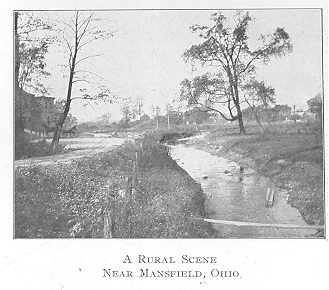
A RURAL SCENE
NEAR MANSFIELD, OHIO,
still remained in force, and at the third session of the General Assembly a strenuous effort was made to revise the whole system, the result of which was a very complete code of tatute laws. The first difficulty conflicting with the Constitution of the United States occured in 1805, and slavery was the cause of it. Massachusetts proposed as an amendment, that representation should be apportioned among the States in the ratio of their free population and submitted this proposition of her "General Court," or Legislature, for the consideration and action of the legislators of the various States. Ohio disapproved on the ground that the Constitution of the United States was the result of compromise, and interference with its provisions would be productive of discord. In the same year, another proposed amendment originated with the Legislature of Kentucky, proposing to take from the Supreme Court of the United States such part of its jurisdiction as related to controversies between citizens of different States, and between a State and its citizens and foreign States and their citizens. Ohio refused to concur, on the ground that "so much of this Constitution as secured to citizens of different States adjudication of claims before an in partial tribunal and free from the influence of any particular State, was one of its most important provisions." While the report added the expression of the fear that "frequent alterations might tend to unsettle the great principles upon which the constitution itself was founded." A third proposed amendment came before the Legislature of Ohio from that of North Carolina, requiring that the power to interdict the importation of slaves should be vested in Congress immediately. To this Ohio answered, that, although concurring in
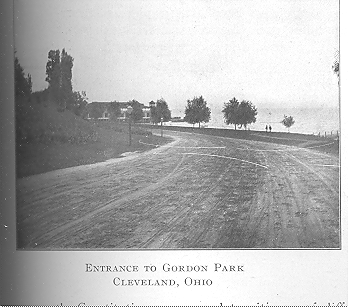
ENTRANCE TO GORDON PARK
CLEVELAND, OHIO
- 65 -
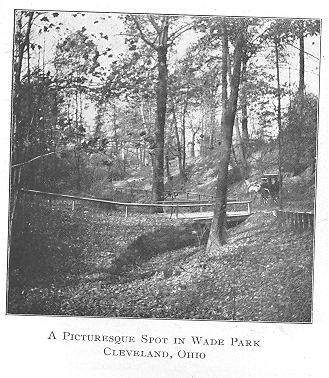
A PICTURESQUE SPOT IN WADE PARK
CLEVELAND, OHIO
sentiment with North Carolina as to slavery and the slave trade, she refused to assent to this proposed amendment, on the ground that, by the constitution of the United States, a time was fixed when Congress alone should have this power, and until that time arrived nothing should be done, and when it arrived nothing need be clone.
In 1805, the Indian claim to the Western Reserve and "Fire Lands," so called, was by special treaty released, and secured to the State of Connecticut. These "Fire Lands," amounting to five hundred thousand acres, had been, by act of her Legislature, donated by Connecticut to certain sufferers by the invasion of Connecticut by the British troops in the Revolutionary War, particularly persons then residents of New London, on the Thames River, at Fairfield, and at Norwalk. These lands included the five westermost ranges of the Western Reserve townships. Lake Erie, with its more southern indentation of Sandusky bay, projected so far southwardly as to leave the space but six tiers of townships and some fraction of land above the forty-first parallel of latitude, or a tract thirty miles from east to west, and twenty-seven miles from north to south. This land was, after its release from Indian possession, surveyed into townships of about twenty-five square miles, each of which was divided into four parts, and, for individual convenience of purchase, subdivided into farm tracts of from fifty to five hundred acres, as the purchaser desired.
In 1803, Napoleon Bonaparte, as First Consul of France, sold to the United States the territory called Louisiana, and which, by a secret treaty, France had but a short time previously obtained from Spain. The price paid by the United States for this immense territory, bounded on the east by the Mississippi River from its source to its mouth, was fifteen million dollars, and when the bargain was completed, Napoleon is reported to have said : "This accession of territory strengthens forever the power of the United States, and I have just given to England a maritime rival that will sooner or later humble her pride." As Spain was highly indignant at the result of the negotiation, and which resulted by the Governor of Louisiana, in 1802, closing the port of New Orleans against United States shipping, it was believed that the inhabitants of Louisiana, being principally French and Spanish, would not submit to American rule. Spain, in defiance of the purchase from France, and the right of the latter to sell, maintained her right to the possession of New Orleans and all the country east of the lower Mississippi, but at length peaceably transferred such possessions, as well as her claim to the territory, which subsequently became the State of Florida. These events had greatly agitated the public mind, and one ambitious adventurer resolved to take advantage of them. Aaron Burr had been placed on the Presidential ticket in 1800, and elected as Vine President with President Jefferson. In. 1804 he had, in a duel, shot Alexander Hamilton, and in consequence became an outcast from the society he moved in. Hence, being despised by this former party men, he was not re-nominated with President Jefferson, and, smarting under the stings of this and other public neglects, he was ready to foster any plot that promised sufficient satisfaction to his
- 66 -
disappointed ambition. Learning that a rich Irish gentleman had purchased an island in the Ohio River, and was living there, he resolved to approach him on his way to New Orleans; and, giving evasive and deceptive reasons to his friends in the East for his journey, proceeded to Wheeling, and from there embarked in an open boat with one attendant for Blennerhassett Island, about sixty miles below. Having arrived, he introduced himself to the proprietor and spent several days with his host and hostess, who, it would seem in a very credulous manner, entered into the plans submitted to them. From there. he pro= seeded by the rivers to Nashville, where he spent some time with General Jackson, who had arranged there a public reception in his honor, and thence he went to New Orleans, where he gained the good will of General Wilkinson, the commandant of the United States troops in that district. By the sea he returned to the East. A second journey West was made, and this time he made Blennerhassett Island the seat of his operations for the rendezvous of a flotilla to carry men whom he had enlisted in his project to the lower country. The United States Government, 'having been advised of these proceedings, in December, 18o6, communicated with Governor Tiffin of Ohio, Who presented the matter to the State Legislature, then in session, and an act was at once passed, authorizing the arrest of persons engaged in unlawful enterprises, as well as authorizing the seizure of their contraband goods. Mr. Blennerhassett escaped with Burr down the river and reached New Orleans in safety. His property was destroyed in the most wanton manner by the militia, and his wife and family subsequently had to fly to Natchez. Burr was arrested in February, 1807, near Fort Stoddard, in Alabama, by Lieutenant (afterwards Major-General) E. P. Gaines. He was taken to Richmond and there tried for treason, but as the evidence was insufficient to prove that his design was a disseverance of the Union, rather than an invasion of and an attempt to set up a foreign government in Mexico, he was acquitted. This was the only important historical event that occurred during the administration 'of the first Governor of Ohio. Nothing marked the course of the next two years except the impeachment of three judges of the Third Circuit Court of Common Pleas. The particulars of the offense are 'worthy of mention.
The charges under the articles of impeachment reported by the House committee against Judge Pease, one of the defendants, were an infraction of the fifth section of the act regulating the jurisdiction of justices of the peace, in deciding in favor of an appeal from the judgment of a justice for a sum exceeding twenty dollars, the justice (having no jurisdiction above that sum; an infraction of the twenty-ninth section of the same act by 'having allowed the plaintiff his cost of suit in an action for a sum between twenty and fifty dollars, commenced by original writ from the Court of Common Pleas, and that, sitting as pre. skiing judge of his court. the had on various occasions decided that that court had full power to suspend, set aside and declare null and void any act of the State Legislature, and in accordance with such, his decision, he had suspended, etc., etc., the fifth section of the act ':defining the duties of justices. In answer, the seventh amendment of the United States :Constitution was pleaded to the first count, and which says: "In suits at common law, when the value in controversy shall exceed twenty dollars, the right of trial by jury shall be , reserved." Also the eighth section of the eighth article of the State Constitution, which declared that "the right of trial by jury shall be inviolate." These references so fully supported the decisions upon which the first charge was founded, that acquittal followed as a
Ater of course, while conviction failed in the second charge from lack of the necessary two-thirds votes required, and the Court decided, by a vote of 16 to 8, that the third charge was insufficient to sustain impeachment.
- 67 -
Another interference by the Legislature with the judiciary took place in 1809-1810. The terms for which the judges had first been elected being about to expire, a resolution was passed, declaring the judicial offices vacant, and thereupon the Legislature proceeded to elect judges for the various courts. In this operation they in some cases elected persons already commissioned for unexpired terms, but when the individual had become in any manner unsatisfactory his office was given to another. At the same time the General Assembly took occasion to reduce the number of Supreme Court Judges from four to three. The purpose was to deprive of his office the judge who had been duly elected and commissioned by the previous Legislature. Much confusion and dissatisfaction naturally ensued in the judiciary department. Judges who held unexpired commissions refused to accept new commissions, and claimed their seats under the old. Such claims made divisions in the courts, and the course of justice was delayed and often prevented; but the Legislature never revised their proceedings, or attempted any justification of their conduct in this matter.
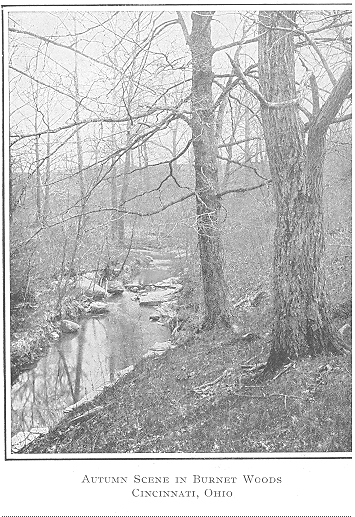
AUTUMN SCENE IN BURNET WOODS
CINCINNATI, OHIO
The session of 1810-1811 was held at Zanesville, but nothing extraordinary took place. The Indians, who, since the Greenville treaty in 1795, had remained quiet, under the 'instigation of a new chief named Tecumseh, aided by British traders and military emissaries from Canada, began to commit acts of aggression upon the inhabitants of the State. of Ohio who were settled near the borders. In October, 1807, an act by Congress prevented the passage from American ports of any commercial shipping, and ordered home from abroad, immediately, all American vessels, for the war that was plainly impending. This act proved a fruitful source of discussion in Congress until the war with Great Britain was declared, and for which this embargo act was on our part the primary cause. So hostile had the Indians, under the lead of Tecumseh, become that, in the spring of 181o, General William H. Harrison, then Gov-ernor of the Territory of Indiana, invited a council, to take place at Vincennes in August. At it, Tecumseh appeared with four hundred fully armed followers. As a result of this council General Harrison believed it necessary to take suitable precautions for war.
In the spring of 1811, the hostile savages began to roam over the Wabash country in small parties, plundering the white settlers and the friendly Indians. Harrison sent word to Tecumseh and his brother; called "the Prophet," that these depradations must cease, and that he was determined and prepared by force of arms to stop them. Tecumseh went to Vincennes, the seat of the Indiana Territorial Government, and there found seven hundred
- 68 -
well-armed militia. After making solemn assurances of friendship he went to the Choctaws, Creeks, Chickasaws and other Southern Indian tribes, and tried to induce them to join him in an aggressive campaign, but without success. In the meantime a much-increased force at Vincennes, obtained from Kentucky and Ohio, having arrived, Gen. Harrison, late in September, 1811, marched up the Wabash Valley toward the town of the"Prophet,"near the junction of Tippecanoe Creek and the Wabash River, and on the way built a fort near the present city of Terre Haute, Indiana, calling it Fort Harrison. There the troops encamped in a healthy elevation, among oak trees, and without underbrush to hinder their operations, and the General was visited by "the Prophet," his brother Tecumseh being absent. Suspecting treachery, the General, on the 5th of November, arranged his camp to resist any sudden attacks. He ordered that the infantry dispose themselves in a suitable manner, and in case of an attack should hold their ground until relieved, the cavalry to parade dismounted with pistols in belts, and act as the reserve. Then two Captains' guards of fifty men each were detailed to defend the camp. Thus prepared the whole camp, except guards and sentinels,
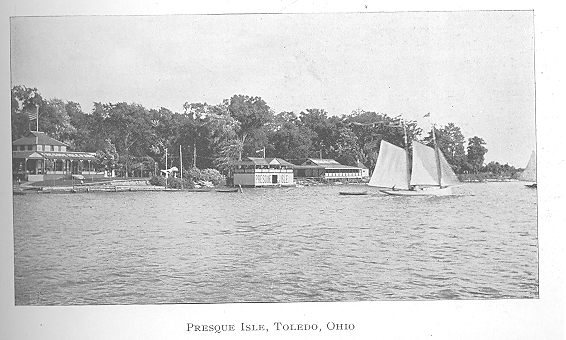
PRESQUE ISLE, TOLEDO, OHIO
went to sleep. The "Prophet," on his part and that of his followers, arranged that when the whites were asleep they should rush in and murder them. To excite his followers he indulged in various incantations, until he had every Indian brought up to a frenzy, when he gave the word to attack. At 4 o'clock on the morning of the 7th of November, General Harrison being in the act of pulling on his boots, the crack of a sentinel's gun caused him to order the whole camp to be aroused. A sharp battle ensued which lasted until daylight, when the Indians were driven at the point of the bayonet into the wet prairie that surrounded the encampment. In that battle there were killed and wounded of the whites one hundred and eighty-eight. The loss to the Indians crippled them from any other attempt to attack Harrison's forces. On the return of Tecumseh from the South he found all his scheme to form an Indian Confederacy prostrated by this act of his brother, and in the War of 1812 he joined the British, to whom he was an active friend.
- 69 -
In June, 1812, the United States declared war against Great Britain. After the ignoble surrender of Detroit by General Hull, by which the territory of Michigan was lost, temporarily, Ohio became the scene of military operations. General Harrison had succeeded Hull, and worked indefatigably, preparing for the winter campaign, which the people demanded. This required much labor. Block houses had to be built and garrisoned along the way to Detroit, and magazines of provisions supplied and defended. But the work went cheerfully On. Kentucky sent militia freely, under the veteran General Shelby. The yeomanry of Ohio and Indiana hastened to report for military duty, and in fact so numerous were the volunteers that orders were 'issued by General Harrison to stop the enlistment. He made the vicinity of the Maumee Valley, near the scene of the battle field of Fallen Timbers, the place of rendezvous, from where he intended to fall upon Malden and Detroit, and he made the brigades from Pennsylvania and Virginia, and that of General Simon Perkins, of Ohio,
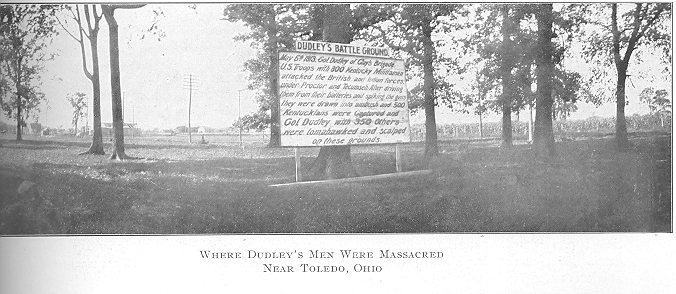
ON THE MAUMEE RIVER
TOLEDO, OHIO
a the right winth the Kentuckians under General 'Winchester as the left wing of his army. The latter, with eight hundred men, reached the Maumee Rapids in January, 1813, where he learned that a force of British and Indians were occupying French Town, now Monroe, Michigan, on the River Raisin, twenty miles south of Detroit. Having sent under Colonels Allen and Lewis a suitable detachment of his force to protect the inhabitants, he was advised late in the evening of the 21st that the foe was approaching, but received the information with incredulity. Nevertheless, it proved to be a fact, and a repetition of St. Clair's surprise and butchery was perpetrated on the morning of the 22d by about fifteen hundred British and Indian warriors. At the River Raisin Winchester surrendered after an agreement with the British commander that ample provisions be made for the protection of his wounded soldiers. The promise was given, but immediately violated, for Proctor, the
- 70 -
British commander, knowing that Harrison was near, hastened to Malden, leaving the prisoners behind, deprived of their arms and without a guard. The Indians followed the British a short distance, when they turned back and fell upon the unfortunate prisoners, butch- ering and scalping without mercy those who could not walk and driving 'before them those
who could, their intention being to hold them prisoners until ransomed at Detroit. By the battle and massacre nearly the whole of Winchester's command comprising the best of Kentucky's youth were destroyed, and afterwards during the war the words "remember the River Raisin" became the war cry of the Kentuckians.
General Harrison had advanced to the Maumee Rapids when he heard of the disaster at River Raisin, and there 'learning that Proctor had marched to Malden, he, at the rapids, established a fortified camp near the present town of Perryville, opposite Maumee City, and which he named Fort Meigs. There he was by Proctor and Tecumseh besieged for several clays, who with about two thousand troops and Indians had come down from Malden, and although he had confidence in the strength of his position, his fort having bastions and

WHERE DUDLEY'S MEN WERE MASSACRED
NEAR TOLEDO, OHIO
several cannon planted, he dispatched a courier to General Green Clay, who was on his march northward with another body of twelve hundred Kentuckians. Clay received the courier in the Maumee Valley, and dispatched Captain Leslie Combs, then nineteen years )1d, with four men of his company and a young Indian. They traveled in a canoe, and, as they approached the rapids, heard the roar of artillery. It was the 5th of May, and Proctor had begun to fire on the fort. Puzzled how to approach, much less enter an invested fort, Captain Combs and his companions having safely passed the rapids, rounded a point that brought them in full view of the besiegers and besieged, when Indians among the former approaching the bank, fired a volley at them, killing one man and wounding two. This caused the Captain to run his canoe to the opposite shore and with his wounded he escaped to the woods, but, making a detour, they fortunately met the advance of the main body of General Clay's troops under the command of Colonel Dudley. Captain Combs, fortunately escaping uninjured, at once took comand of his company of riflemen, which was in the advance of Colonel Dudley's command, and pressing forward, attacked and captured a British
- 71 -
battery, spiked most of the guns and hauled down the hated and despised British flag, while huzzas rang out from the ramparts of Fort Meigs. Captain. Combs' men, having been signaled to fall back and cross the river, fell into an Indian ambush and were made prisoners. The savages then attacked the other men of Dudley's command as they followed him from the boats, and of the eight hundred massacred and scalped all but one hundred and seventy-five, who reached the fort in safety. In the meantime Colonel Boswell, with the rest of Clay's troops, fought his way through the British and Indians toward the fort, where, being joined by a rallying party, he, thus assisted, drove the motley enemy from their 'batteries. Proctor then abandoned the siege and returned to Malden. Combs and his .companions were taken to Fort Miami, then in possession of the Indians, where, being stripped nearly naked, they were made to run the gauntlet between two rows of savages and thus many were killed. The survivors were then placed inside the fort, where, but for Tecumseh, they would have all been murdered, as Proctor was so enraged at the termination of the siege, that he made no attempt to stay the bloody instinct of the Indians.
When General Harrison was assured that Proctor and his allies had returned to Fort Malden, he left Fort Meigs in charge of General Clay, and proceeded to meet Governor Meigs, of Ohio, who, with a considerable force of Ohio militia, was pressing forward to his relief. General Harrison found the Ohio settlements so full of enthusiasm that ample assistance was to be had for the asking, and he at once began, with the consent of Governor Meigs, to enlist troops. Meanwhile, Tecumseh had urged Proctor to resume the siege and capture of Fort Meigs, but, satisfied that he could not do so, Proctor, with his white troops, embarked on the 28th of July for Sandusky Bay, from there to proceed to attack Fort Stephenson at Lower Sandusky, now Fremont, on the Sandusky River. That fort was a regular earthwork, with ditch, bastions and block houses, garrisoned with one hundred and sixty inexperienced young men, none of whom had reached the age of majority, under the command of Major Croghan, of the regular army, himself a young man of but twenty-one years of age. The enemy numbered five hundred regulars and militia and above three thousand Indians. By reason of the weak position, General Harrison had instructed the commander to fire the fort and retreat, if he could, should the enemy approach with force and artillery, but the youthful commander had bravely stuck to his post, determined rather to die than surrender to the superior forces of the enemy. After reaching Fort Stephenson Proctor demanded a surrender, accompanied with the usual threats of butchery and massacre if the garrison should hold out ; but Croghan, who found that all his companions, zealous like himself, would support him to the last, returned a spirited answer to the effect that "when the fort should be taken there would be none left to massacre; as it would not be given up while a man was able to fight."
A brisk firing was opened by the enemy during the night, and at an early hour the following morning three six-pounders which had been planted during the night within two hundred and fifty yards of the pickets began action upon the fort, but fortunately with but little damage. About 4 o'clock in the afternoon all the enemy's guns were concentrated against the northwestern angle of the fort for the purpose of making a 'breach. To counteract the effect of their fire Major Croghan caused that point to be strengthened by means of bags of flour, sand and other materials, in such a manner than the fort sustained little or no injury. But the British, supposing that their fire had sufficiently shattered the fort to make an advance advisable, began to storm the place with a force of five hundred, and at the same time made two feints on different points. The column which advanced against the northwestern angle was so completely enveloped in smoke as not to be discovered until it had approached within eighteen or twenty paces of the lines, but the men being all at their
- 72 -
posts and ready to receive the enemy, they commenced so heavy and galling a fire as to throw the column into confusion ; but being quickly rallied, Colonel Short, the commander, explained, "Come on, my brave fellows, give the damned Yankees no quarter," and immediately leaped into the ditch, followed by his troops. As soon as the ditch was entirely filled by the assailants, Major Croghan ordered his one six-pounder, which had been masked in the Mock house, to be fired. It had been loaded with a double charge of musket balls and slugs. This piece completely raked the ditch from end to end. The first fire leveled one-half in death, Colonel Short being mortally wounded, the second and third discharge either killed or wounded every one in the ditch except eleven who were found covered by the dead bodies of their companions. At the same time the fire of the small arms was so incessant and destructive that it was in vain the British officers exerted themselves to lead an the balance of the column; it retired in disorder under a shower of shot and sought safety in an adjoining wood. The loss to the British in killed was about one hundred and fifty, besides a considerable number of their Indian allies. The Americans had but one killed and seven slightly wounded. Early in the morning of the 3d of August, the enemy retreated down the

BOULEVARD AND HARBOR
PUT-IN-BAY, OHIO
river, after having abandoned considerable baggage and military stores. The garrison was composed of regulars, all Kentuckians. They were as human as they were courageous. This was proved by their unceasing attention to the wounded enemy after their discomfit- ure; for during the night they received into the fort through the fatal porthole of the block house all those who were able to crawl to it. To those unable to move they threw canteens filled with water. They even parted with their clothing to alleviate the sufferings of the wounded.
Soon after this gallant exploit which called for the admiration of the whole country, Tecumseh followed Proctor to Detroit, and all hope was given up by the enemy of reducing the American forts until they could gain entire control of the lakes.
The spirit of the American people was roused to a pitch of enthusiasm, and there was earnest determination to prosecute hostilities with vigor, but without the command of lake offensive operations could not be carried on to any great advantage. The utmost
- 73 -
exertions accordingly were made by Commodore Perry, who, in the harbor of Erie, was building a flotilla to complete his naval armament, and to test the ability of his gallant sailors in a contest with the enemy on Lake Erie. Commodore Perry, notwithstanding all obstacles and hindrances, had his fleet equipped by the 2d of August, but some time was lost in moving several of the vessels over the bar at the mouth of the harbor of Erie. On the 4th of August, he sailed in quest of the enemy, but not meeting them, he returned on the 8th. Receiving re-enfcrcements brought to :him by Captain Elliot, he again sailed on the 12th, and on the 15th anchored in the bay of Sandusky. There he took in about twenty volunteer marines, and again went in search of the enemy, and after cruising off Malden, retired to Put-in Bay, a distance of thirty miles. His fleet consisted of the brig "Lawrence,"
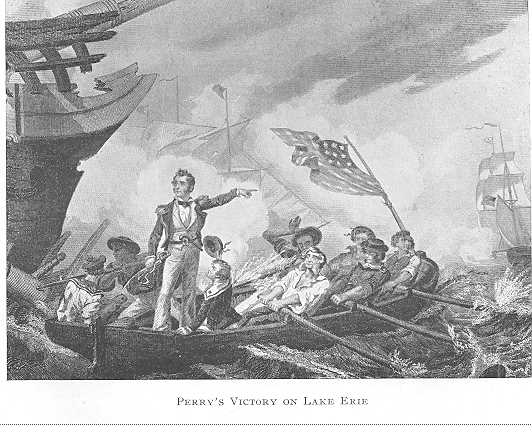
PERRY'S VICTORY ON LAKE ERIE
his flag vessel, of twenty guns ; the "Niagara," Captain Elliot, of twenty guns; the "Caledonia," Lieutenant Turner, of three guns; the schooner "Ariel," of four guns; the "Scorpion," of two guns ; the "Somers," of two guns and two swivels ; the sloop "Trippe," and the schooners "Tigress" and "Porcupine," of one gun each, amounting in all to nine vessels, fifty-four guns and two swivels. Commodore Barclay, who had heretofore avoided the encounter, soon after deemed it prudent to meet Perry's fleet and test the question of superiority on the inland sea. Accordingly, very early on the morning of the Toth of September, he bore down upon Perry's squadron, which immediately got under way, and stood out to meet the enemy. The Americans had three vessels more than the British, but this advantage was fully counterbalanced by the size and armament of the British fleet, which
- 74 -